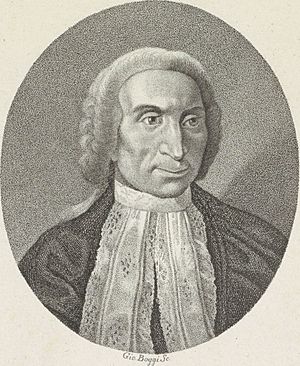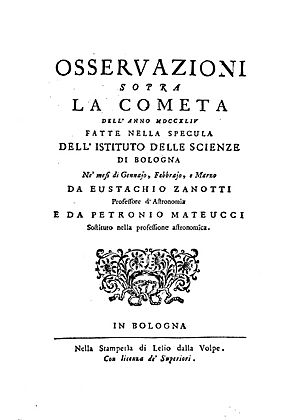Eustachio Zanotti facts for kids
Quick facts for kids
Eustachio Zanotti
|
|
|---|---|
 |
|
| Born | 27 November 1709 Bologna, Papal States |
| Died | 15 May 1782 Bologna, Papal States |
| Occupation | Astronomer, engineer |
| Movement | Scientific Revolution |
| Parent(s) | |
Eustachio Zanotti (born November 27, 1709 – died May 15, 1782) was an Italian astronomer and engineer. He spent much of his career working at the famous astronomical observatory in Bologna, Italy.
Contents
Life of Eustachio Zanotti
Eustachio Zanotti was born in Bologna. His father, Giampietro, was a talented poet, painter, and art historian. His uncle, Francesco Maria Zanotti, was also a well-known philosopher.
Early Education and Career
Eustachio went to Jesuit schools, where he became very interested in science and mathematics. He was taught by Eustachio Manfredi, a leading astronomer, at the Bologna observatory. Eustachio started working at the observatory in 1729. He earned his degree from the University of Bologna in 1730.
In 1738, he studied Isaac Newton's important ideas about light. After Manfredi passed away in 1739, Eustachio Zanotti became the director of the Bologna observatory.
Key Discoveries and Contributions
Zanotti made many important contributions to astronomy and science:
- He improved the tools and instruments used at the observatory.
- He calculated the exact oval path (elliptical orbit) of a comet.
- He carefully recorded when planets passed in front of the Sun. For example, he observed Mercury on May 6, 1752, and Venus on June 6, 1761.
- Using these observations, he tried to figure out the distance between the Sun and Earth. He also worked to find the size of Venus using a method called parallax. This method measures how much an object seems to shift when viewed from different places.
- From 1751, he worked with his assistants, Petronio Matteucci and Giovanni Angelo Brunelli, to create an ephemeris (a table showing where planets and stars will be at certain times) and a star catalogue.
Other Scientific Work
Zanotti also helped restore a large sundial in 1776. This sundial was originally designed by Giovanni Domenico Cassini in the San Petronio basilica. He also made predictions about the shape of the Earth. He suggested that the Earth was slightly flattened at its poles, based on Newton's laws of motion.
He observed the northern lights and was very interested in how water flows. He was elected a Fellow of the Royal Society of London in 1740. He was also a member of other important scientific groups in Italy and Germany.
Engineering and Art
As an engineer, Zanotti worked on projects related to water flow. He helped settle arguments about how water moved in rivers like the Rhine and the Po. He was involved in draining marshy lands and planning new canals. He also wrote about the mathematics behind perspective in art, trying to connect the worlds of math and art.
Works
 | Selma Burke |
 | Pauline Powell Burns |
 | Frederick J. Brown |
 | Robert Blackburn |


